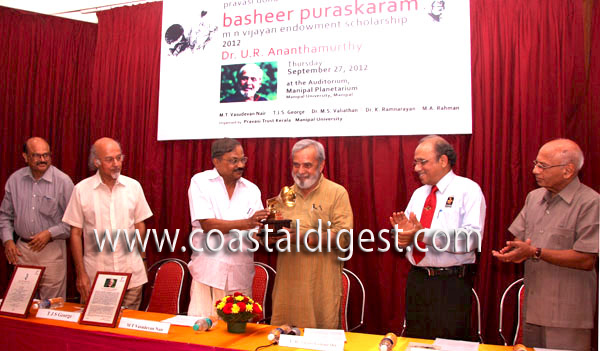Speaking after receiving “Basheer Puraskaram-2012” in a programme organised by Pravasi Doha and Manipal University on Thursday, the litterateur said Basheer is a major Indian writer and he should be discussed all over India.
Likewise, the renowned Kannada writer Kota Shivaram Karanth should also be discussed in India. Indians write stories that have depth, he said quoting the examples of Basheer's work.

Jnanpeeth awardee M T Vasudevan Nair presenting “Basheer Puraskaram-2012” to another Jnanpeeth awardee U R Ananthmurthy in Manipal on Thursday. Manipal University Vice Chancellor K?Ramnarayan and others look on.
He said Basheer was humorous and his relation with Basheer developed as both discussed Karanth during the initial years. Many young people read Basheer and he has major influence on all, said Dr Ananthmurthy.
Stating that his relationship with Kerala had wonderful culmination with the award ceremony, Ananthmurthy said the children who are educated in the mother tongue especially in the government school interconnect themselves to the west in their own way and also to the villages being themselves.
He added that in Kerala, minorities do not look like minorities and he wished the same thing to happen in Karnataka.
Speaking after presenting the award, Jnanpeeth awardee M T Vasudevan Nair said writer Basheer is very much alive. “Basheer is totally different unlike other writers. Even now he is eagerly read by the readers of all generations. A large number of Basheer's books are in circulation. His style is inimitable.
I was a part of several incidents in his life,” he said.Nair also shared his cherishable moments with Ananthmurthy. He said this is the first time that Basheer Puraskaram is given away to the litterateur outside Kerala.
Plans are on to take the award all over India. Ananthmurthy was the first one to propagate to make Malayalam as the first language in the state, he added.
Renowned Columnist T J S George opined that Basheer and Ananthmurthy should have come together long ago. He added it is impossible task to introduce Basheer.
Speaking about Basheer, he said: “His life is contradiction to all the rules of lives. He was an illiterate and poor wanderer who suffered police beating and also jail sentence.
He underwent mental asylum. It is amazing and unbelievable story to see such a man rising to the top of literary creativity. His life was literature.
His strength was that he was an illiterate. He did not know many words who used words directly in a precise way. He kept inventing words to convey the mood and imagination of the story. He ignored the basic grammar besides he had his own logic arguments.
His logic defied logic and fascinated the readers. His unpredictability, originality and sheer imagination made Basheer as Basheer. He could blend tragedy with humour rarely done by many writers. The master of this art was done by Charlie Chaplin. His literature was exclusively his own.”
George also said that artist M F Hussein and Basheer had similarity. Though both were Muslims, they were unconventional. They were uneducated but were educated in the university of life, he added. Basheer was the Hussein of letters and Hussein was Basheer of art.
Basheer is not really translated, however some great efforts have been done. George regretted that Basheer's essential qualities of linguistic and originality remain unreachable outside Malayalam, he added.
The award also includes an endowment scholarship of Rs 15,000 instituted in the name of Prof M N Vijayan, noted scholar and critic for the students of award winner's village. The award was given to Abhishek from Tudur Government High School in Shimoga.





Comments
Add new comment